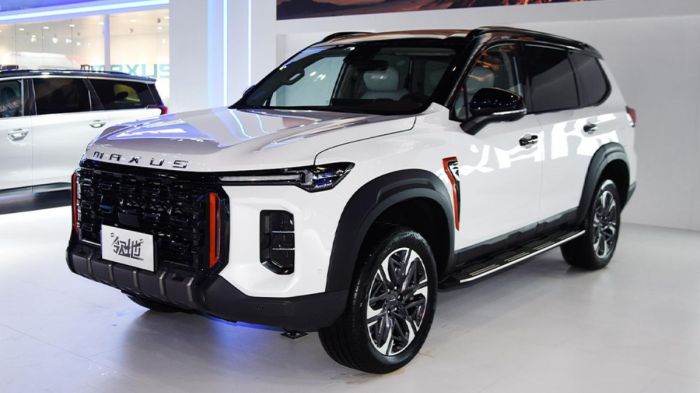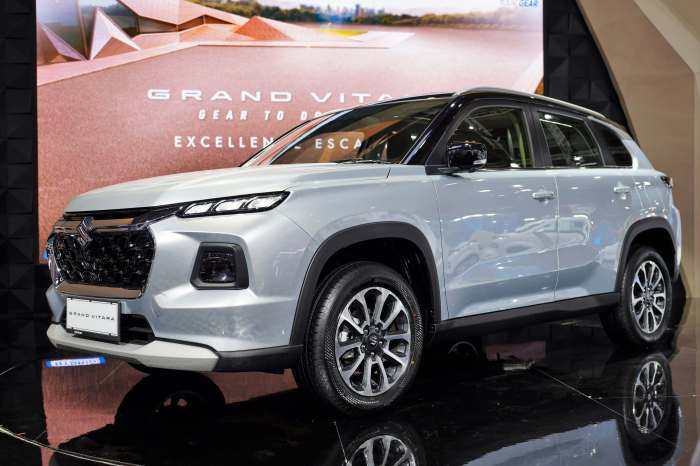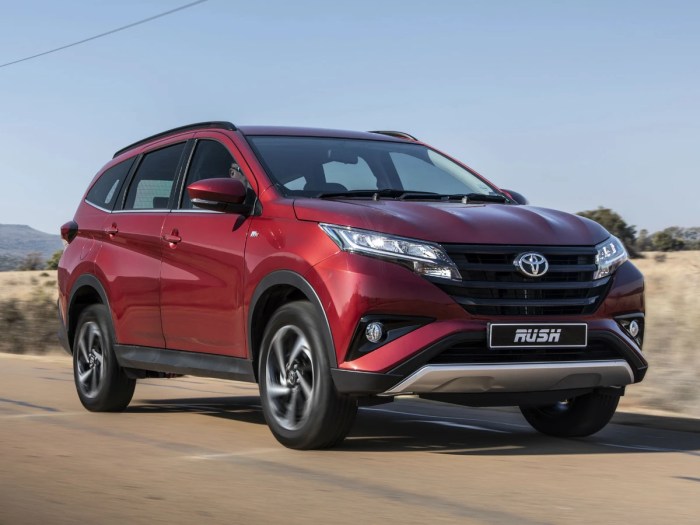New Car SUV Price A Comprehensive Guide
Average New Car SUV Prices
New car suv price – The price of a new SUV varies significantly depending on several factors, including size, features, manufacturer, and location. Understanding these factors is crucial for making an informed purchase decision. This section provides a comprehensive overview of average new SUV prices, categorized by class and manufacturer, along with an analysis of the key influencing factors.
Average SUV Prices by Class
The following table presents average prices for new SUVs across different classes. Note that these are averages and actual prices can vary widely based on specific models, trims, and options.
| SUV Class | Average Price (USD) | Price Range (USD) | Notes |
|---|---|---|---|
| Compact SUV | $25,000 | $20,000 – $35,000 | Includes popular models like the Honda CR-V and Toyota RAV4. |
| Mid-Size SUV | $35,000 | $30,000 – $50,000 | Models such as the Honda Pilot and Toyota Highlander fall into this category. |
| Full-Size SUV | $50,000 | $40,000 – $80,000 | This includes larger SUVs like the Chevrolet Tahoe and Ford Expedition. |
| Luxury SUV | $70,000 | $60,000 – $150,000+ | Examples include the BMW X5, Mercedes-Benz GLE-Class, and Cadillac Escalade. |
Average SUV Prices by Manufacturer
Manufacturer reputation and brand positioning significantly impact pricing. Luxury brands generally command higher prices than mainstream manufacturers. Below is a general overview, and specific model pricing will vary greatly.
- Toyota: Known for reliability, Toyota SUVs tend to fall within the average price range for their class.
- Honda: Similar to Toyota, Honda SUVs are generally priced competitively within their respective segments.
- Ford: Ford offers a wide range of SUVs, from affordable options to more premium models, resulting in a broader price spectrum.
- BMW: As a luxury brand, BMW SUVs are positioned at the higher end of the price range.
- Mercedes-Benz: Similar to BMW, Mercedes-Benz SUVs are typically among the most expensive in their class.
Factors Influencing Average SUV Prices
Several factors contribute to the variation in SUV prices. Understanding these elements is essential for informed decision-making.
- Engine Size: Larger engines generally increase the cost due to increased manufacturing complexity and higher performance capabilities.
- Fuel Efficiency: SUVs with better fuel economy ratings may command a slightly higher price due to increased demand and advanced technology integration.
- Features and Technology Packages: Advanced features like adaptive cruise control, lane departure warning, and premium infotainment systems significantly impact the price.
- Safety Ratings: Higher safety ratings, often reflected in advanced safety features, contribute to a higher price point.
Price Comparison Across Manufacturers
Comparing pricing strategies across manufacturers highlights the impact of brand image and target market. This section focuses on three major players: Toyota, Ford, and BMW.
Comparable SUV Models and Starting Prices
The following table compares starting prices for comparable SUV models from three different manufacturers. These are approximate starting prices and may vary based on trim level and options.
| Manufacturer | Model | Class | Starting Price (USD) |
|---|---|---|---|
| Toyota | RAV4 | Compact SUV | $27,000 |
| Ford | Escape | Compact SUV | $26,000 |
| BMW | X3 | Compact SUV | $45,000 |
Brand Reputation and SUV Pricing

Source: momobil.id
Established brands with strong reputations for quality and luxury command higher prices. Toyota and Ford, known for reliability and value, are generally priced competitively. BMW, representing a luxury brand, commands a premium price due to its brand image and perceived prestige.
Impact of Location on Price: New Car Suv Price
Geographical location plays a significant role in determining SUV prices. Demand fluctuations, taxes, and dealership competition all contribute to regional price variations.
Regional Variations in SUV Prices
Areas with higher demand for SUVs, such as urban centers, may experience slightly higher prices due to increased competition among buyers. Conversely, rural areas might see lower prices due to lower demand and potentially less competition among dealerships.
Dealership Location and Competition, New car suv price

Source: suzukicdn.com
Dealerships located in areas with high competition may offer more competitive pricing to attract customers. Conversely, dealerships in areas with limited competition may have more pricing power.
Illustrative Examples of New SUV Prices
This section provides detailed pricing information for three specific SUV models, illustrating the price-feature relationship.
Specific SUV Model Pricing and Justification
- Toyota RAV4: A base model RAV4 might start around $27,000, offering a balance of practicality, fuel efficiency, and reliability. Adding features like all-wheel drive and advanced safety packages can increase the price to $32,000 or more.
- Honda CR-V: Similar in pricing to the RAV4, a base CR-V might start around $26,000. Higher trim levels with additional features can push the price closer to $35,000.
- BMW X3: The starting price for a BMW X3 is significantly higher, often exceeding $45,000. This premium is justified by the brand’s reputation, luxury features, and advanced technology integration.
Value Proposition Comparison: Two Similarly Priced SUVs
A $35,000 budget might allow for a top-of-the-line Honda CR-V or a base-model Ford Explorer. The Honda emphasizes fuel efficiency and technology, while the Ford offers more space and towing capacity. The best choice depends on individual priorities.
Feature and Price Comparison: Trim Levels of a Single SUV Model

Source: co.za
Consider three trim levels of a hypothetical SUV, the “Apex”: The base model (Apex S) at $30,000 offers essential features. The mid-range model (Apex X) at $35,000 adds advanced safety and infotainment. The top-tier model (Apex Z) at $40,000 includes luxury features like leather seats and a premium sound system.
Financing and Purchasing Options
Several financing options exist for purchasing a new SUV. Understanding these options is crucial for making the best financial decision.
Financing Options for New SUVs
- Auto Loans: Traditional auto loans from banks or credit unions offer fixed interest rates and predictable monthly payments.
- Manufacturer Financing: Automakers often offer financing options with competitive interest rates and potential incentives.
- Leasing: Leasing involves paying a monthly fee for the use of the vehicle over a set period, typically three or four years. At the end of the lease, the vehicle is returned to the leasing company.
Leasing Terms and Overall Cost
Leasing terms typically include a down payment, monthly payments, and a mileage limit. Exceeding the mileage limit can result in additional charges. Leasing can be a cost-effective option for those who prefer to drive new vehicles frequently, but it doesn’t build equity.
Manufacturer Incentives and Rebates
Manufacturers often offer incentives and rebates, such as cash back offers, low-interest financing, or lease deals, to stimulate sales. These incentives can significantly reduce the overall cost of purchasing a new SUV.
Detailed FAQs
What are the typical down payment requirements for a new SUV?
Down payment requirements vary depending on the lender and the loan amount. Generally, a larger down payment results in lower monthly payments and a lower overall interest cost. Expect down payments to range from 10% to 20% of the vehicle’s price, but some lenders may offer financing with lower down payments.
How long do new SUV warranties typically last?
The price of a new car SUV can vary greatly depending on the make, model, and features. However, if you’re looking for a stylish and reliable alternative, consider the price point of a different vehicle segment. You might find that the pricing for a new car, like the hyundai i30 new car price , offers a compelling comparison when considering your overall budget for a new vehicle, irrespective of whether it’s an SUV or not.
Ultimately, understanding the price range across various vehicle types helps make an informed decision.
New SUV warranties typically include a bumper-to-bumper warranty covering most parts and systems for 3-5 years or a specified mileage limit. Powertrain warranties, covering the engine, transmission, and drivetrain, often extend to longer durations (5-7 years or higher mileage).
What are the typical insurance costs for a new SUV?
Insurance costs for new SUVs vary greatly based on factors such as the vehicle’s value, your driving record, location, and coverage level. Larger, more powerful SUVs generally command higher insurance premiums than smaller, more fuel-efficient models. It’s recommended to obtain quotes from multiple insurers to compare rates.





















